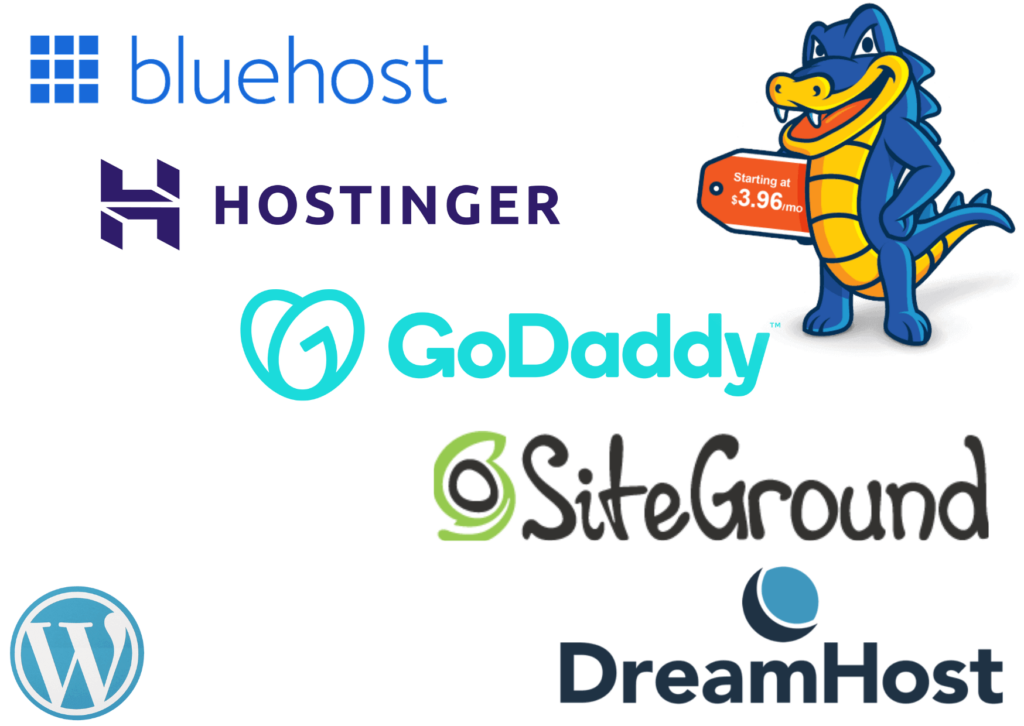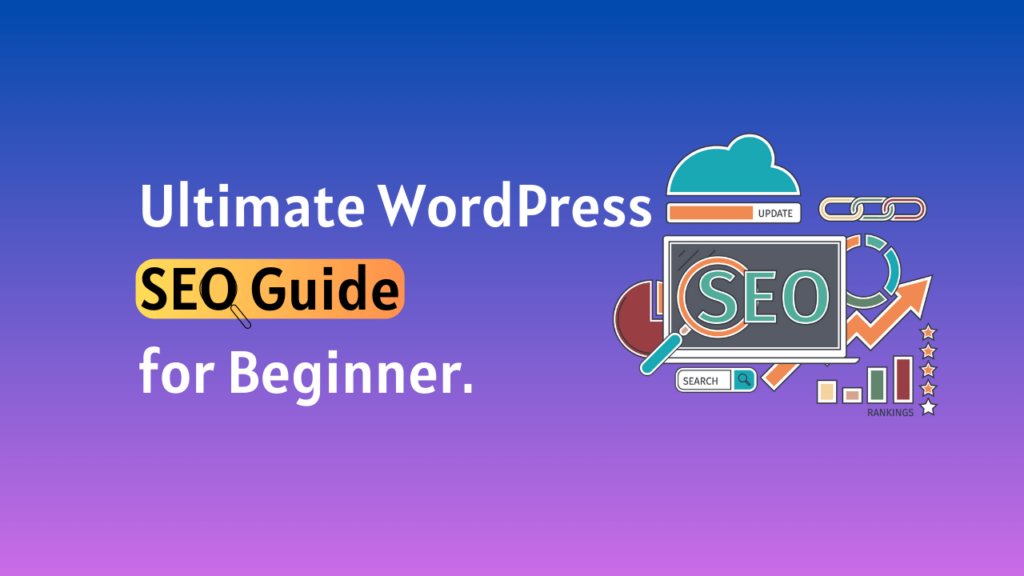If you are a website owner or a blogger using WordPress, you must be aware of the importance of search engine optimization to improve the visibility of your website and attract more organic traffic.
In this ultimate guide, we will take you through the essential aspects of WordPress SEO to help you optimize your website effectively.
What is SEO?
Search Engine Optimization is known as SEO. It’s the process of increasing the visibility of your website on search engines like Google, Yahoo, and Bing. It uses a variety of techniques and strategies to improve the ranking of your website in search engine results.
Why is SEO Important for Your WordPress Site?
SEO refers to the practices and techniques used to improve a website’s visibility on search engine results pages (SERPs). It specifically focuses on optimizing websites built on the WordPress platform. Using SEO methods on your WordPress site boosts its odds of appearing higher in search results, resulting in more natural traffic and potential customers.
Common Misconceptions About WordPress SEO:
- SEO is a one-time task: Many website owners mistakenly believe that implementing SEO techniques once is sufficient. In reality, SEO requires ongoing efforts and monitoring to maintain and improve your website’s rankings.
- Keywords are the only factor: While keywords are crucial for SEO, they are just one aspect of the overall optimization process. Other factors like website speed, mobile-friendliness, user experience, and high-quality content also contribute to SEO success.
- SEO guarantees instant results: SEO is a long-term strategy that takes time to yield noticeable results. Achieving noticeable enhancements in your website’s search engine rankings demands patience, steady efforts, and ongoing improvements.
Getting Started with WordPress SEO:
- Choosing a reliable hosting provider.

In WordPress SEO, it’s vital to choose a trustworthy hosting provider. Seek one with speedy and dependable servers because how fast your site loads matters for search rankings. Also, make sure they have strong security measures to safeguard your website from potential risks.
- Picking the Perfect Domain Name.
Your domain name should be relevant to your niche and easy to remember. It should also include relevant keywords.
- Installing WordPress.

After you’ve arranged your hosting and domain, go ahead and install WordPress. Many hosting providers make this process easy with a one-click installation, simplifying your website setup.
- Selecting an SEO-friendly WordPress Theme.
Picking the right WordPress theme is also important for SEO. Look for a theme that is lightweight and well-coded, as this will improve your website’s loading speed. Look for themes that are responsive and mobile-friendly, as search engines prioritize mobile-friendly websites.
- Choose the Right SEO Plugin:
WordPress offers a range of powerful SEO plugins that can streamline your optimization efforts. Some popular options include Yoast SEO, Rankmath and All in One SEO Pack. These plugins can help you with keyword optimization, internal linking, XML sitemaps, and other SEO-related tasks.
Optimizing Your WordPress Website:
1. Ensuring your website is indexable by search engines.
To boost your WordPress website’s visibility in search engines, the initial step is to make sure that search engines can include it in their listings. Here are some important things to think about:
- Make a Sitemap: A sitemap is a file listing all your site’s pages. Creating and giving it to search engines like Google helps them find and crawl your pages better.
- Add Meta Tags: These are code snippets providing info about your pages. Include proper meta tags, like titles and descriptions, to help search engines grasp your content.
2. Setting up an SSL Certificate for Secure Browsing:
With online security becoming increasingly important, setting up an SSL certificate is crucial for your WordPress website. Here’s why:
- Build trust with users: An SSL certificate ensures that the data exchanged between your website and visitors is encrypted and secure. This builds up confidence and trust in your brand.
- Boost SEO rankings: Search engines prioritize websites with SSL certificates, as it is a signal of a secure and trustworthy site. By having an SSL certificate, you can improve your SEO rankings and visibility.
- Protect sensitive information: If your website collects any personal or sensitive information, such as payment details, having an SSL certificate is essential to protect this data from unauthorized access.
On-Page SEO Techniques for WordPress:
1. Optimizing page titles and meta descriptions.
Improving your page titles and meta descriptions is essential for enhancing your search engine rankings. These elements provide a concise preview of your web page’s content in search engine results. When crafting page titles, include:
- Target Keywords: Incorporate relevant keywords naturally to improve your page’s visibility for specific search queries.
- Keep it Concise: Stick to a length of 50-60 characters to ensure that your entire title appears in search results.
When writing meta descriptions:
- Create a Compelling Description: Write a concise and engaging summary of your page’s content, using relevant keywords where appropriate.
- Limit the Length: Aim for a meta description length of around 160 characters to ensure it appears fully in search results.
2. Utilizing Keywords and Alt text for Better Rankings:
Keywords are crucial in deciding how high your content appears in search engine results. When you’re optimizing your WordPress site:
- Keyword Research: Find appropriate keywords using tools like Google Keyword Planner, ahrefs, and Semrush. Naturally, include these keywords in your content to boost its search engine visibility.
- Optimize Image Alt Text: When adding images, make sure they have descriptive alt text with relevant keywords. This helps search engines understand your image content and enhances accessibility.
Off-Page SEO Strategies for WordPress:
Building high-quality backlinks to your site.
A crucial off-page SEO strategy for your WordPress site is creating top-notch backlinks. Backlinks are links from other websites that show search engines your site’s credibility and popularity. Here are some tips to build backlinks:
- Guest blogging: Contact reputable websites in your field and propose creating helpful guest articles that link back to your website.
- Content promotion: Share your valuable content on social media platforms, forums, and communities to attract attention and earn backlinks.
- Influencer outreach: Collaborate with industry influencers and ask them to mention or link to your site in their content.
WordPress SEO Plugins and Tools:
1. Overview of popular SEO plugins:
- Yoast SEO: A highly recommended and widely used WordPress SEO plugin with features like content analysis, XML sitemap generation, and social media integration.
- Rank Math: A newer but increasingly popular SEO plugin known for advanced SEO abilities, including schema markup, keyword optimization, and detailed SEO analysis.
- All-in-One SEO Pack: Another well-liked plugin featuring user-friendly design and powerful functions such as XML sitemaps, canonical URLs, and advanced SEO analytics.
2. Utilizing tools to analyze website performance:
Besides SEO plugins, utilizing tools to analyze your website’s performance is essential for effective SEO. Here are some useful tools you can consider:
- Google Analytics: This free tool reveals vital insights about your website’s traffic, user behaviour, and conversions, helping you identify strong-performing pages and areas for enhancement.
- Google Search Console: Register your site with it to track how it appears in search results and spot issues affecting your visibility.
- SEMRush: This all-in-one SEO tool offers competitor analysis, keyword research, and backlink analysis to optimize your content and stay competitive.
Mobile Optimization for WordPress:
1. Optimizing Your Website for Mobile Devices.
When it comes to SEO for your WordPress website, mobile optimization is vital. Most internet users browse on their mobile devices, so having a mobile-friendly site is a must, not a choice. Here are some tips to optimize your website for mobile devices:
- Use a Responsive Theme: Pick a theme that adapts your site’s layout to different devices.
- Optimize Page Loading Speed: Make your site load faster for mobile users by compressing images and reducing CSS and JavaScript files by using caching plugins.
- Keep Menus Simple: Streamline navigation and menus for mobile users with dropdowns and collapsible sections for easy access.
2. Mobile-Friendly Design and Responsiveness.
- Responsive Design: This ensures that your website adjusts to various screen sizes and resolutions, giving users a smooth experience on different devices. This is essential for mobile optimization and SEO.
- Readable Content: Ensure that your content is easy to read on smaller screens. Use legible font sizes, clear headings, and sufficient spacing between paragraphs.
- Mobile-Friendly Forms: If your website uses forms, make sure they are optimized for mobile. Use input fields that are easy to tap, avoid complex validation rules, and use autocomplete features when possible.
By optimizing your WordPress website for mobile devices, you not only improve the user experience but also enhance your SEO efforts.
Utilizing social media for increased visibility:
Social media platforms are vital for increasing the visibility of your WordPress website and attracting more visitors. Here are some ways to leverage social media for SEO:
- Create engaging content: Develop content that’s interesting and encourages your intended audience to share it.
- Optimize your profiles: Improve your social media profiles with appropriate keywords, descriptions, and links to your website.
- Interact with your audience: Reply to comments, messages, and mentions on social media to establish connections and boost your brand’s visibility.
Remember, off-page SEO strategies like building backlinks and utilizing social media require consistency and effort to yield long-term results.
Tracking and Measuring SEO Success:
1. Monitoring website analytics and traffic.
When you’re working on making your WordPress site better for search engines, it’s important to keep an eye on and measure your SEO efforts. This helps you figure out what’s effective and what needs to be improved. To monitor your website analytics and traffic, follow these steps:
- Install a web analytics tool like Google Analytics: This will help you track important metrics such as website traffic, user behaviour, and conversions. Set goals and standards to measure your SEO strategy’s success.
- Monitor organic search traffic: Keep an eye on organic search traffic in your analytics dashboard. This will give you insights into how well your SEO strategies are performing and if your website is ranking for relevant keywords.
2. Using data to make informed SEO decisions.
Data-driven decision-making is the key to effective SEO. Here’s how you can use data to make informed decisions:
- Analyze keyword performance: Identify top-performing keywords and adjust content and meta tags accordingly.
- Monitor user behaviour: Study metrics like bounce rate, time on page, and conversion rate to enhance the user experience.
- Track backlinks: Watch backlink quality and quantity for better search engine rankings.
By consistently monitoring and analyzing the data and analytics of your website, you can use this information to make smarter decisions for your SEO strategies. This will help you get the most out of your website and attract more natural visitors to your WordPress site.
Common WordPress SEO Mistakes to Avoid for Optimization:
Duplicate Content:
- Search engines penalize duplicate content.
- Ensure each page has unique and valuable content.
Keyword Stuffing:
- Avoid overusing keywords to manipulate rankings.
- Focus on creating high-quality content with natural keyword integration.
Best Practices for URL Structure and Site Architecture:
Other important aspects of WordPress SEO are:
1. Well-structured URL and Site Architecture: Use descriptive URLs with relevant keywords. It Helps search engines understand page content and increases the chances of higher search rankings.
2. Organized Categories and Subcategories: Creating a logical hierarchy for users and search engines facilitates site navigation and improves user experience.
3. Website Loading Speed Optimization: Utilize caching plugins, optimize image sizes, and minimize unnecessary code to ensure your site loads quickly and smoothly.
Importance of ongoing optimization and adaptation:
Remember, SEO is an ongoing process. As algorithms continuously evolve, it is crucial to monitor your website’s performance and adapt your strategies accordingly. To outperform your competitors, make sure to frequently refresh your content, examine your website’s statistics, and stay informed of the most recent developments in your industry.
Conclusion:
Optimizing your WordPress site for SEO is an ongoing process, but it’s a rewarding one. By following the recommended methods in this guide and consistently working to make your WordPress website better, you can boost your search engine rankings, attract more natural visitors, and ultimately expand your business’s online presence.
